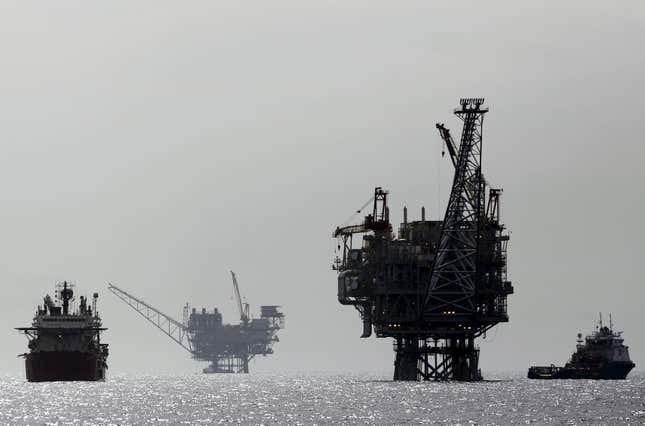Israel’s cabinet has finally approved a big increase in natural gas drilling in the east Mediterranean. Now, the full Knesset must sign off on it. While the agreement seems likely, the months of tussling that proceeded it means the drillers could be forgiven if they were to develop second thoughts about fully committing to plans to invest $1.5 billion over the next two years.
The potential for a petro-bonanza in Israel, a nation that’s been entirely reliant on energy imports since its birth, is a huge local development. Israel might not only be gas-independent; it could earn years of large royalty payments—bringing in a considerable haul despite the global plunge in natural gas prices.

The field in question is Leviathan, which contains the natural gas equivalent of an estimated 3.9 billion barrels of oil. For comparison purposes, the industry regards a 1-billion-barrel field as a “supergiant” or an “elephant.”
The gas is seen as a potential source of political security for Europe, which has been wishing to wean itself off of Russian gas. Last year, Noble Energy and Delek Energy, the Leviathan partners, made the first step in achieving that aim by agreeing to sell $30 billion of gas to BG for use in an Egyptian liquefied natural gas plant, for onward shipment in whole or part to Europe.
The story goes back to the mid-2000s. When no one else would, Noble and Delek committed millions of dollars in expenses to validate the presence of natural gas offshore from Israel. By now, the drilling of Leviathan was supposed to have already begun. The companies were to deliver first gas by 2018.
But not long before work was to start, a government agency stepped in and stopped the action. It said that Noble and Delek were monopolists, and probably should have the rights to much less of the field.
The latest decision takes a gigantic, sensible step back—if Israel proceeded with the reversal of the contract, you can bet that no reputable companies would step in to take their place; they would be insane to, since politics could again reverse anyone’s deal.
Yet few think the politics are over. In an Aug. 17 note to clients, Eurasia Group’s Michael Barron forecast a “persistent high level of political interference in the project from both the government and the Knesset.”
Barron expects the political players to escalate existing demands for a cap on prices, and to closely scrutinize private sales agreements reached by the companies.
While it’s a lot of gas, the world is awash in the stuff—Noble, for example, doesn’t have to be in Israel. The companies aren’t threatening to stop, but other companies have said they are no longer interested in Israel because of the political snafus.
